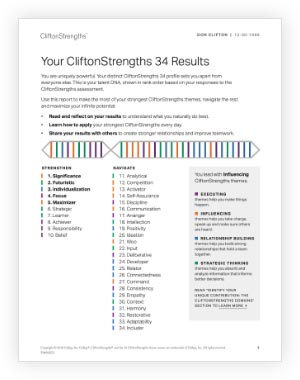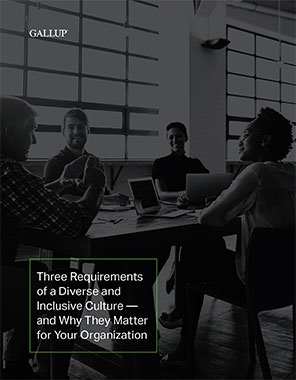Story Highlights
- CliftonStrengths helps employees meet the human need to fit in and stand out
- Employees want to be understood and valued for their unique qualities
- Employees who feel they belong share more opinions, ideas and critiques
We all face the same internal conflict -- the need to fit in and the need to stand out.
We want to be accepted and included by others while still being understood and valued as a unique person. Social psychology teaches us that this phenomenon is normal -- it's just the human condition.
But that condition puts added pressure on people who are a minority on their work teams.
Fitting in may sometimes seem to require abandoning aspects of their personality, upbringing, culture, etc., to fit the larger group. That's degrading. In some cases, standing out may feel isolating or alienating. That's miserable.
People don't leave that inner tension at the office door.
In fact, the pressure to make a difference and a living can make that tension feel more acute -- especially for members of historically marginalized demographics. The need to fit in, stand out, and overcome stereotypes and prejudice exacerbates that internal conflict.
It can be exhausting, and the work can suffer because of it.
Unless properly understood and productively addressed, this aspect of organizational psychology can undermine a company's inclusion initiatives, its cultural values, its engagement levels and individuals' performance.
For members of historically marginalized demographics, the need to fit in, stand out, and overcome stereotypes and prejudice can be exhausting.
The CliftonStrengths assessment can help.
CliftonStrengths and Inclusiveness
The CliftonStrengths assessment identifies a person's natural talents and capacities to perform at excellence.
It's a development tool -- the more you work with your strengths, the stronger they get -- and a means of tailoring talent to task and improving performance. That aspect of CliftonStrengths can materially affect business outcomes.
On average, workgroups that received strengths-based development showed:
- 10% to 19% increased sales
- 14% to 29% increased profit
- 3% to 7% higher customer engagement
- 6% to 16% lower turnover (in low-turnover organizations)
- 26% to 72% lower turnover (in high-turnover organizations)
- 9% to 15% increase in engaged employees
- 22% to 59% fewer safety incidents
Reason enough to use strengths as a developmental tool.
But there's a corollary benefit to using CliftonStrengths: while developing strengths on the job, CliftonStrengths helps people become known for what they do best as well as their demographic background.
Our backgrounds impact our perspectives and that lends constructive insights into the work. But we are more than our demographics, and CliftonStrengths helps people to be understood and valued for their unique qualities.
That can increase feelings of inclusion.
In organizational psychology, "inclusion" refers to the feeling of being welcomed and appreciated for who you are, your special and unique personhood, and the contributions you offer to the work.
CliftonStrengths presents who you are, as well as what you do at excellence. Nothing feels more welcoming than being valued..
CliftonStrengths helps people become known for what they do best as well as their demographic.
One Gallup case study, conducted for a client interested in the impact of its diversity and inclusion initiatives, shows how this plays out.
Some teams received the CliftonStrengths assessment, some didn't, and some teams were in the middle of the process.
Researchers found that teams that received the CliftonStrengths assessment had significantly higher inclusion scores. Which isn't terribly surprising.
What is surprising is that when the study was conducted, the client's teams hadn't yet received any CliftonStrengths coaching.
All they had was the assessment report. Even teams in which some but not all had completed the assessment had higher inclusion responses -- 30% higher.
So it appears that simply knowing that you are uniquely valuable promotes feelings of inclusion.
And likely, that also helps you feel like you stand out -- thus resolving half of the perpetual internal conflict.
And the other half, the part that wants to feel you belong?
Paradoxically, CliftonStrengths can help resolve that need as well, which can help companies in their drive for a more diverse workforce.
CliftonStrengths and Diversity
CliftonStrengths shows individuals' unique value to the team, but CliftonStrengths also centers the individual in the team.
That's how strengths-based teams can solve the other half of the age-old internal conflict, the drive for a feeling of "belongingness," as it's referred to in the literature.
The need for belongingness is psychologically important.
But it's organizationally important too: If you feel you belong, you're more comfortable sharing opinions, ideas, and critiques.
Those are the attributes of a diverse workforce that improve performance and why companies work so hard to attract a diverse labor pool.
Meanwhile, people are less likely to feel like tokens when they see that their talents are needed.
You're not filling a race/gender/age quota if you're doing the necessary work that someone with Strategic, say, or Relator, or Discipline -- all CliftonStrengths themes -- can be expected to do at excellence.
But CliftonStrengths has a somewhat subtler effect as well: The common language of CliftonStrengths can dissolve the "otherness" of other people and replace it with "alikeness" of strengths themes.
Our strengths are innate and powerful drivers of thought, feeling and behavior.
And those drivers are as powerful, and sometimes more so, than our upbringing or culture.
Discovering that others are more than you knew them to be is powerful.
Discovering that you are more than you knew yourself to be is revelatory.
Finding that you share deeply meaningful motivators with someone who appears very different at face value?
That can shake a stereotype to its core.
Discovering that others are more than you knew them to be is powerful. Discovering that you are more than you knew yourself to be is revelatory.
And it goes a long way to creating a feeling of belongingness.
Human to Human
Henry Ford once asked, "Why is it every time I ask for a pair of hands, they come with a brain attached?"
Cynical? Sure.
But also short-sighted -- those brains are what provide value to a company.
That value is why companies have D&I initiatives: Diverse, inclusive businesses that invite individual contributors into welcoming teams make use of a wider spectrum of human talent.
That's why diverse, inclusive companies are more successful.
Still, Ford wasn't wrong; all employees do have brains attached. Brains that cause people to feel the need to stand out and fit in.
CliftonStrengths can help companies square that paradox.
What's more -- it's better for business to help people resolve the conflict productively than suffer it degradingly, miserably alone.
The internal, eternal me/we conflict is just part of being human.
But so are strengths. And with knowledge of innate ability, managers and leaders can put people to work where they're most likely to perform at excellence. That lets people feel uniquely valuable for who they are, and it makes teams more welcoming while improving outcomes.
Gallup can help you develop a workplace culture where people both feel valued for their unique qualities and like they belong:
- Give the CliftonStrengths assessment to your team or the entire organization.
- Find a CliftonStrengths coach and do even more with your greatest talents.
- Download our perspective paper, Three Requirements for a Diverse and Inclusive Culture -- and Why They Matter for Your Organization
- Learn how we can partner with you to create a workplace where all people can be themselves.




